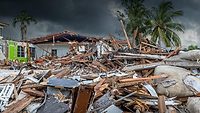Disaster Response: Damage Assessments Underway in Hurricane Helene's Wake
Hurricane Helene Leaves a Trail of Destruction Across the Southeast: Extensive Damage, Power Outages, and Rescue Efforts Underway

Photo courtesy AP Photo/Gerald Herbert
The aftermath of Hurricane Helene has left communities across the Southeast grappling with extensive damage and destruction. After making landfall in Florida's Big Bend region on Sept. 26, the Category 4 storm caused widespread power outages and resulted in a tragic death toll of at least 64 people. The storm's destruction has led to early damage estimates ranging from $15 billion to $110 billion, underscoring the severity of the impact.
As the storm clouds cleared, officials began to assess the destruction, revealing the extensive rebuilding efforts needed across multiple states. In North Carolina, significant flooding caused landslides that blocked roads and rendered many areas inaccessible. Lillian Govus, director of communications for Buncombe County, expressed the overwhelming nature of the disaster, stating, “This has been a disaster of unquantifiable proportions, and this is the Hurricane Katrina of our community.” Such comments highlight the severe emotional and physical toll the storm has taken on residents in affected areas.
The storm brought historic rainfall, with some locations in western North Carolina receiving over 30 inches, prompting catastrophic flash flooding. Emergency officials have advised against travel in these areas, stating that “all roads in western North Carolina should be considered closed.” This has left many residents, especially in cities like Asheville, stranded as crews work to clear blocked roads.
Rescue efforts have been a priority, with North Carolina Gov. Roy Cooper indicating that the level of devastation is unprecedented. “The catastrophic devastation to western North Carolina is like nothing we have ever seen,” he said. Reports confirm that over 200 individuals have been rescued as emergency responders continue their work amidst challenging conditions.
The power restoration process is also ongoing, with millions still without electricity. Duke Energy reported significant outages, particularly in the Carolinas, where restoration efforts are hampered by flooded roads and infrastructure damage. In Florida, efforts are underway to restore power to remaining customers, with a hopeful timeline set for the end of the weekend.
As the recovery unfolds, Jennifer Pippa from the American Red Cross noted that more than 9,400 evacuees are currently sheltering across 143 locations. Emergency management teams are mobilizing resources to support those affected, underscoring the community's resilience in the face of adversity.
In the coming days, damage assessments will continue as federal agencies, including FEMA and the U.S. Coast Guard, collaborate on recovery efforts. They are mobilizing personnel to survey the damage and prioritize areas in need of immediate assistance. The scale of recovery required after such a devastating storm is immense, and communities are coming together to navigate the challenges ahead.
For further details on the ongoing response to Hurricane Helene, read more here.
Source: Derek Lacey, told ENR.Looking for a reprint of this article?
From high-res PDFs to custom plaques, order your copy today!









